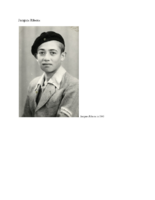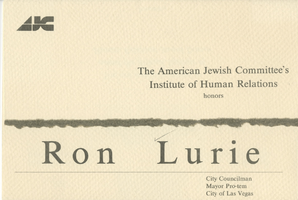Search the Special Collections and Archives Portal
Search Results

Transcript of interview with Bob Arum by Barbara Tabach, October 20, 2016
Date
Archival Collection
Description
Bob Arum is the founder and CEO of Top Rank boxing promotions company in Las Vegas, Nevada. Born in New York, Arum is a former attorney and a member of the International Boxing Hall of Fame. He promoted his first fight for Muhammad Ali in 1966 and moved Top Rank’s headquarters to Las Vegas in 1986. He has produced countless fights in the city and helped to make it “The Fight Capital of the World.” In this interview, Arum talks about the path that led him to a career in boxing promotion, from childhood in Brooklyn, New York, to education at New York University and Harvard Law School, and finally meeting Muhammad Ali while working at New York law firm. He discusses his work with Ali, as well as other boxers, including Marvin Hagler, Sugar Ray Leonard, Tommy Hearns, Roberto Durán, George Foreman, and Oscar De La Hoya, and the growth and evolution of the sport over the past forty years. In addition, Arum talks about the role of Judaism in his life, his involvement with the local Jewish community, and the importance of the Chabad movement.
Text

Photograph of Jayn Marshall and Jerry Countess, 1990s
Date
Archival Collection
Description
Jayn Marshall, left, and Jerry Countess, right, at an event for the Jewish Federation.
Image

Transcript of roundtable interview about Kristallnacht with Esther Finder, Raymonde Fiol, Alexander Kuechel, Philipp Meinecke and Rabbi Felipe Goodman, by Barbara Tabach, March 17, 2015
Date
Archival Collection
Description
In this interview, the participants discuss their experiences during Kristallnacht, and the commemoration events in southern Nevada with Holocaust survivors and their families. Mr. Kuechel recounts his journey through concentration camps and being liberated by the Russians. Rabbi Goodman talks about meeting Mr. Meinecke, whose grandfather was a high-ranking SS officer. Meinecke discusses his upbringing in Germany and trying to learn about his family's involvement in the Holocaust, and the hope he felt after the fall of the Berlin Wall as Jews returned to Germany. The group discusses the importance of Holocaust education because there are still so many untold stories.
On November 9th to November 10th, 1938, in an incident known as Kristallnacht, Nazis in Germany torched synagogues, vandalized Jewish homes, schools and businesses, and killed close to one hundred Jews. In the aftermath of Kristallnacht, also called the Night of Broken Glass, some thirty thousand Jewish men were arrested and sent to Nazi concentration camps. German Jews had been subjected to repressive policies since 1933 when Nazi Party leader Adolph Hitler became chancellor of Germany. However, prior to Kristallnacht these Nazi policies had been primarily nonviolent. However, after Kristallnacht conditions for German Jews grew increasingly worse. During World War II, Hitler and the Nazis implemented their so-called final solution to what they referred to as "the Jewish problem" and carried out the systematic murder of some six million European Jews in what is now commonly known as the Holocaust.
Text
Suzie Chenin oral history interview
Identifier
Abstract
Oral history interview with Suzie Chenin conducted by Barbara Tabach on September 29, 2015 for the Southern Nevada Jewish Heritage Project. Chenin discusses her father, one of the first Jewish dentists in Las Vegas, Nevada, and moving there when he was stationed at the Nellis Air Force Base. Chenin also talks about her career as a real estate agent and selling advertising for the Las Vegas Sun newspaper.
Archival Collection

Biographical essay by Jacques Ribons, 2014
Date
Archival Collection
Description
Jacques Ribons describes his life during the Nazi occupation of Poland. During the liquidation of the Jewish ghetto, his family decided to turn themselves in to the Germans. They were sent to a prison and separated. He and his brother survived and went to France with the OSE, and came to the United States in 1947.
Text
Deanne Alterwitz-Strasler oral history interview
Identifier
Abstract
Oral history interview with Deanne Alterwitz-Stralser conducted by Barbara Tabach on November 01, 2014 for the Southern Nevada Jewish Heritage Project. Alterwitz-Stralser discusses moving to Las Vegas, Nevada with her husband and their four children to assume ownership of Walker Furniture, leading the design and merchandising elements of the business, and integrating into the local Jewish community.
Archival Collection
Jerome Countess oral history interview
Identifier
Abstract
Oral history interview with Jerome Countess conducted by Dorothy Eisenberg on October 28, 2014 for the Southern Nevada Jewish Heritage Project. Countess discusses coming to Las Vegas, Nevada in 1976 to take a job with what became the Jewish Federation. He then talks about starting the local Jewish Reporter, a newspaper, and creating a community among fellow Jews in Las Vegas.
Archival Collection
Audio clip 1 from interview with Priscilla Schwartz, June 16, 2016
Description
In this clip, Pricilla Schwartz describes her Jewish education as a child
Audio clip from interview with Elliot Karp, December 17, 2014
Date
Archival Collection
Description
Part of an interview with Elliot Karp on December 17, 2014. In this clip, Karp talks about his vision of the Jewish Federation of Las Vegas as a tent under which all Jewish people can find a place to thrive.
Sound

Ron Lurie campaign materials and resume, item 13
Description
Invitation for The American's Jewish Committee's Institute of Human Relation's Award Dinner honoring Ron Lurie
